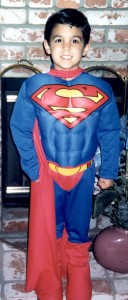
I still kick myself every time I realize how high my expectations and demands have been while raising my oldest son. What have I been thinking? Were my parents also this strict and demanding on my oldest sister? If so, I might feel a little relieved by the knowledge that most new parents eventually realize that some of the rules imposed and the overall behavioral expectations towards their first born were just unreasonable. The simple act of pulling out old pictures of when my boys were younger typically makes me go down this road of parental remorse. At every stage of his life my oldest son always appears to me as behaving too immature for his age, but when I look back at images of him from the past I then realize he was just a boy and obviously not as big as I made him out to be in my mind. How do I stop this from happening? To make things worse, I also realize that it never happens with my youngest son. On the contrary, to me he seems too mature for his age, which is also most likely an incorrect assumption of my part. The double standards that reveal themselves in this kind of erroneous parental baseline cannot be healthy for either one of my boys.

I have observed this to be true with other parents too, but when the subject comes up between adults it is typically dismissed as “oh well, too bad.” Somehow these unfair parenting techniques find themselves justified by the fact that the child grew up to be a good adult so it couldn’t of done any harm to raise them this way in the first place. I am personally not sure that this is a healthy mentality to promote towards parenting, but I am also not sure that there is any way around the problem either. In my early parenting days so very little formal advice worth promoting had been published that we heavily relied on the advice from elders. Today it might even be more difficult to know what is right and what is wrong since there are so many different schools of thought on the subject and it seems almost impossible to narrow down the success of any of them. I am by no means an expert on this subject, but there is one thing I can testify to, and that is the fact that the oldest child in a household most definitely has it the roughest.
The years go by, and now when my oldest son is finally at the age of 17 I realize that raising him has taught me probably more than I have been able to teach him. At what price I ask myself? What has been the cost of me learning to be a better father and can it be measured in any negative effects to his own self esteem and mental growth? More importantly can I still at this stage find a way to make it right and give him the fair equivalent of what a good father should be, or is it too late to make amends and undo any of the damage that my rookie parenting might of caused in him? I am not claiming that I am a terrible father, not at all. In fact I know that overall I have been more than patient and that my love has flowed into his person as it should from a good dad to a good son. This is not so much a moment of regrets, as it is of honesty and self assessment. Even more to the point, this is about letting any of you that might be starting on your journey into parenthood appreciate the value of a free lesson in the subject of Dad 101.
He always looked so damn big to me! Why? His tiny hands should of been an instant indication that even though he looked as if he truly was “Superman,” in fact the most that he could of been at that age was “Superboy.” Even so, I should of always kept in mind that just as I seem to be strong and fit, I too am not made of steel. It is easy for those around us to visualize us as strong males with very little space for the weaknesses of our emotions, but this is rarely true with any man, much less any child. If you are of the opposite gender, you might think that it is easier for us to brush it off, let it slide, and to get on with our lives when we get hurt. On the contrary, I contend that the fact that we internalize a lot of our emotions might make us even weaker in the end. The fact is that we hurt just as much as anyone else, and all things considered, a male child is not one bit stronger emotionally than a female child.
If I could do it all over again, I know that I would get a lot more of my parenting right. It is easy to say this after having to deal with so much harder issues with my son in his teenage years than those that were sporadically creeping their head when he was much younger. I just hope that as time goes by and my children become men, they are able to take some of these words I am now writing and use them while raising their own kids.
So the lesson for you dad is that boys are not made of steel. Your first born might always give you the appearance that he should be doing this or that better by his age, but when you find yourself grading his abilities, behaviour, and maturity, it would serve you well to go back into that big box of pictures you still have not put into albums and take a closer look at him from the day he was born until the present moment. If you look at those images and he looks so small, so childish, and so innocent, then you might realize that indeed that is who he really was at the time, a little boy and not “Superboy.” At all times this child will always be younger and less experienced than you so don’t expect him to be perfect because he is work in progress just like you still are when it comes to parenting.
I would like to encourage readers that if they enjoy reading above post, they are welcome to download the entire Volume I of this series of DAD 101 in KINDLE format by linking to:
http://www.amazon.com/Dad-101-Things-Parenting-ebook/dp/B007R5JFQ6/ref=sr_1_1?ie=UTF8&qid=1334853479&sr=8-1
Or doing a quick search on Amazon.com by the author’s name Vicen Morales. I look forward to your comments and reviews.
Dad4Life
Very nice post! I will definitely share this to my friends. Thanks for sharing.